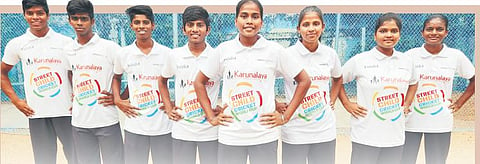From the streets to the stadium in Chennai
CHENNAI: For the past month, as the sun played peekaboo and hit the city with its first rays, a group of kids began their day at 5:30 a.m., sharp. After getting ready in their practice uniforms, socks, shoes, and a cap in half an hour, they hit the ground running. Their rigour included catching, bowling, batting, and wicket-keeping. At dusk, the routine repeated as they got together again after school.
These practice drills are conducted for the Street Child Cricket World Cup (SCCWC), held once in four years a month ahead of the ICC World Cup. It is overseen by Street Child United (SCU), a global movement for street children, based out of the UK. This year’s Street Child Cricket World Cup was held in collaboration between the Street Child United UK and the Shree Dhaya Foundation run by Latha Rajinikanth. Since India is hosting the ICC World Cup this year, SCCWC was hosted in Chennai. The finals of the match were held on Saturday.
SCCWC helps children get a global platform to represent their country and families without shelter in their country. This helps attract sponsors from individuals, entities, and the government to better the people’s livelihood on the streets.
One of the Indian teams, Indian Tigers, is backed by Karunalaya, a non-profit voluntary organisation working for the protection and development of street and working children in the city. The defending champions are trained by Karunalaya. “The mission is to give street children a voice, dispel misconceptions about them, and advance their rights globally through cricket, formation of a children’s club to talk and discuss issues, and participating in scouting and guiding,” says Paul Sunder Singh, founder of Karunalaya.
With its mission set right, the organisation’s cricket team won the first SCCWC in 2019 at the Lord’s Cricket Ground, London. One of the players from the team, Monisha B, talks about her London journey. “I was only 13 when I was playing the first year. I was not well aware of my achievements — playing at the iconic cricketing ground, the Lords. Now that I have realised, I will make sure no other player from my team knows anything and everything about this game, nationally and internationally.”
Life-changing stories
The 18-year-old lives on the pavement near the Wall Tax Road. She lost her father when she was 11 years old. To support the family, Monisha’s mother works as a sweeper. Bringing laurel to their family is Monisha, who is the captain of India Tigers this year. “I was the youngest in the team last time and the oldest this year. I have learned from my seniors and hope to employ them in forming a team that acquires more opportunities,” she says.
Monisha takes her role as captain quite seriously. She asks every player’s opinion and then makes a decision that is best for the team. Other than practising and helping with the game, she also talks to her teammates about their problems and supports them in every way possible.
One of her team members is 16-year-old Vignesh P, who completed his ITI training after class 8 to become a plumber. He says that he gets nervous when he sees other players from other teams. “I get nervous when a player plays well. My coach helped me overcome this fear. He told me it was their game and they were playing it and similarly I should focus on my game,” he says. This piece of advice helped him to better his game. He also strives to help the other children on the street. “I am here as a representative of all the kids on the street and I have to give my best so that they can have a life that they don’t even dare to dream of,” he adds.
The team constantly comes up with strategies to defeat their opponent. In one of this year’s World Cup matches, the Indian Tigers played against the Indian Cats. “Their batting and bowling were not on par with us. So we toned down the way we play. We did not display our full strength. Despite not giving our best we won the match,” says Vignesh.
On the pitch
Titled ‘Street 20’, the game is played only for 20 balls — four balls for five overs on a 13-metre pitch with a tennis ball. Each team must consist of eight players — four boys and four girls. Each player is trained to be an all-rounder, except the wicketkeeper, who is compulsorily a girl. “This way gender equality and friendship are taught, and it also promotes equal opportunities for everyone irrespective of gender,” adds Paul Sunder.
There are three groups, A, B and C, comprising teams from 13 countries. There were seven Indian teams and they were all part of the C group. The top two teams from each group’s points table entered the quarterfinals, from which four qualify for the semi-finals and the game comes down between two to take the trophy home.
Starting the matches on September 25, eyeing the trophy, the Indian Tigers finished first on the points table, qualifying for the quarterfinals, and played against Sri Lanka. Not breaking the winning streak, they entered the semi-finals to play versus Zimbabwe. Despite having their strategies in place, the Indian Tigers found it difficult to beat Zimbabwe and lost to them in the semi-finals. The finals were held between Zimbabwe and Uganda, and the latter lifted the trophy on Saturday night at the Amir Mahal Ground.

